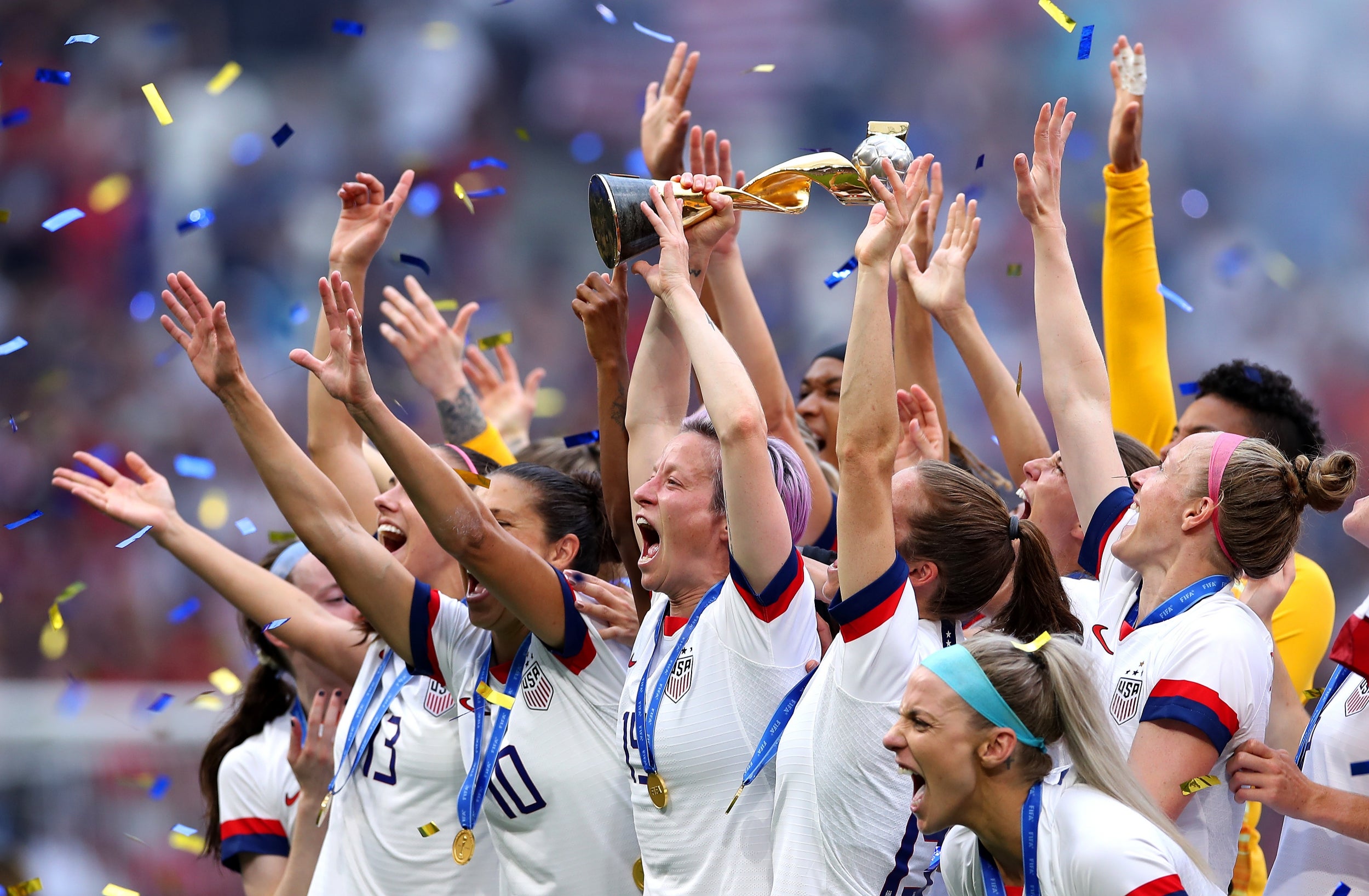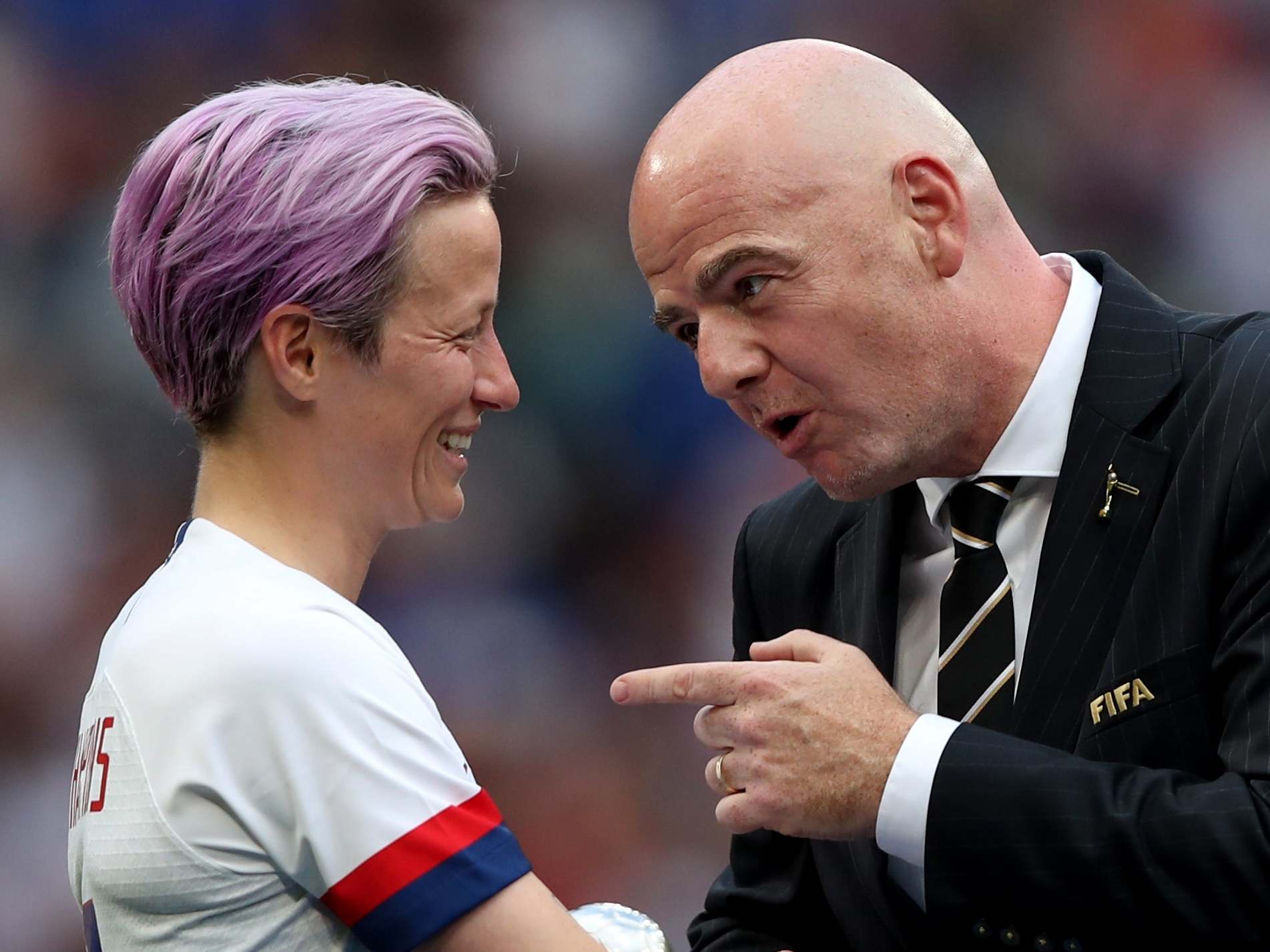The Women’s World Cup was never going to spark a new era overnight – but its legacy can be revolutionary
If one of the tournament’s end products sees the most successful and internationally-recognised team finally earning equality with their male counterparts, then it will have been an achievement
Many wanted and some even expected this to be the World Cup which established women’s football as a major global sport. But whether the last month has been a success in that regard is going to depend on – to paraphrase the Golden Ball winner – “the next step”. Will the interest hold? Will crowds grow? And crucially, will football clubs, associations and authorities invest in the women’s game?
These questions cannot be answered in the immediate aftermath of the final. For now, the tournament can only be judged on the 31 days of competition that ended with the United States victorious on Sunday. And when attempting to make a fair assessment, it would be wrong to ignore some of the more uncomfortable, disappointing aspects.
Attendances were poor, or at least poorer than expected. Records were supposed to be broken according to Fifa’s optimistic pre-tournament ticket promotions. Embarrassingly, the organisers revised those predictions after five days of half-empty stadiums. In the end, the 1.13m figure was not only lower than four years ago in Canada, but the 1999 and 2007 tournaments too, repeating the rise and fall pattern in attendances since 1991.
There were the mismatches, too. Thailand, most famously, but Jamaica also finished bottom of their group with a double-digit minus in their goal difference column. South Africa, Chile and Argentina were better but struggled to truly compete. But at least these teams, despite not particularly well-resources and composed largely of semi-professionals and amateurs, were present. They are not the ones deserving of criticism.
Where were the nations who fund their men’s team so well yet are rarely seen in the women’s arena? Where were Mexico and Uruguay? What about Belgium and Portugal? Croatia’s men were runners-up at their World Cup last summer, but their women finished bottom of their qualifying group. Of all those nations, only one has previously reached a final.
Women's World Cup best pictures
Show all 32And then, there was the predictable outcome. Talk of European nations closing the gap peaked when seven of the eight quarter-finalists hailed from this side of the Atlantic. But such talk felt hollow on Sunday, when the United States deservedly retained their status as world champions. The Americans have won half of the Women’s World Cups to date. They have still never finished worse than third-place.
If this was the dawning of a new era in women’s football, it often looked a lot like the old one. But perhaps the differences came further away from the corners of France in which the World Cup was played. Certainly, the disappointing attendance figures were offset by record-breaking television audiences.

England’s viewing figures have been well-publicised, but records were broken in the States, Brazil, Germany, Italy and China as well. It is estimated that close to a billion have tuned in worldwide.
And it is fair to say many of that number will remember one name from the tournament above all others. Megan Rapinoe has emerged as both an icon and an iconoclast. She is not only now the most recognisable women’s player on the planet, but a figurehead who can lead the sport’s fight for wider recognition. She has used her platform at this tournament to discuss LGBT issues, the representation of women within the media, and of course the Trump presidency.

How Rapinoe chooses to use her enhanced profile – now at a level equal to or greater than that of one of her predecessors, the reserved Mia Hamm – will probably have more of an impact on the image of women’s football than the actions of any other player. That is regardless of performances, too. She has played well the last month, but ask journalists covering this tournament whether she was the best player in France and there will be a mixed bag of opinions. In this reporter’s humble one: no, probably not. But is she the player of the tournament? Absolutely.
But as Rapinoe would almost certainly argue herself, those struggling for gender equality between the men’s and women’s games want to make strides on a collective basis rather than an individual one. Rapinoe spoke of all players, not just Americans, in her post-match appeal on Sunday. Any progress must be tangible and measurable too. That is what the pay dispute between Rapinoe, her team-mates and US Soccer is about.
And that is why the chants of “equal pay” that cascaded down on Fifa president Gianni Infantino were important. Here, in it’s final act, the Women’s World Cup gave the sport’s authorities an unambiguous demand, backed up by a body of winning performances as evidence. Fifa can and probably will fudge the issue, passing off the protests as an internal American matter, ignoring the reasons why Infantino was targeted. But it will be much harder for US Soccer to overlook thousands of their patrons, in what was supposed to be a moment of pure celebration, instead insisting that they pay what they owe.
This tournament was never going to transform women’s football overnight. But if one of its end products is the most successful and internationally-recognised team finally earning equality with their male counterparts, then it will have been an achievement.
Subscribe to Independent Premium to bookmark this article
Want to bookmark your favourite articles and stories to read or reference later? Start your Independent Premium subscription today.




Join our commenting forum
Join thought-provoking conversations, follow other Independent readers and see their replies
Comments